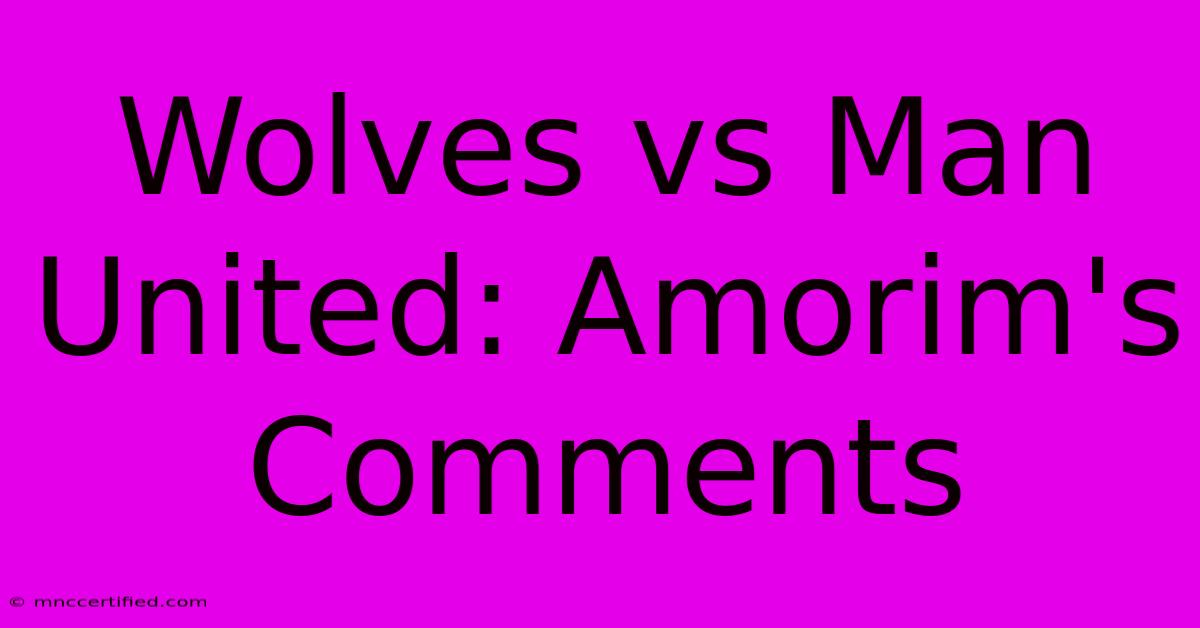Wolves Vs Man United: Amorim's Comments

Table of Contents
Wolves vs Man United: Amorim's Comments Spark Debate
The recent Wolves vs Man United match wasn't just a clash of Premier League titans; it ignited a firestorm of debate thanks to Sporting CP manager, Ruben Amorim's, outspoken comments. His assessment of the game, particularly concerning refereeing decisions and Manchester United's style of play, has sparked a fervent discussion amongst fans and pundits alike. Let's delve into Amorim's statements, the context surrounding them, and the ensuing controversy.
Amorim's Post-Match Analysis: A Controversial Take
Following the intense Wolves-United encounter, Amorim didn't mince words. His comments, delivered with characteristic passion, focused on several key aspects of the match. He reportedly expressed his belief that certain refereeing calls favored Manchester United, influencing the game's outcome. Furthermore, he offered a critical, albeit arguably subjective, analysis of United's playing style. While the exact wording may vary depending on the source, the core message remained consistent: Amorim felt the match wasn't a completely fair reflection of the on-field action.
Specific Points of Contention:
-
Refereeing Decisions: Amorim likely highlighted specific instances where he felt the referee made questionable calls that impacted Wolves' performance. Identifying these specific decisions is crucial to understanding the context of his criticism. Did he point to a missed penalty, a questionable yellow card, or a controversial foul? Analyzing these instances provides a deeper understanding of Amorim's viewpoint.
-
Manchester United's Tactics: Amorim's assessment of Man United's approach likely went beyond simple tactical analysis. Did he criticize their physicality? Did he accuse them of time-wasting? Understanding the specific aspects of United's game that drew Amorim's criticism is vital for a comprehensive analysis of his statements.
-
The Broader Context: It's important to note that Amorim's comments shouldn't be viewed in isolation. His background and experiences as a manager might influence his perspective. Considering his own managerial style and philosophy helps contextualize his critique of the Wolves-United match.
The Backlash and Subsequent Debate
Amorim's candid remarks haven't been without consequence. His comments have generated considerable debate amongst football fans and analysts. Some support his views, arguing that referees often make mistakes and that certain teams benefit from favorable treatment. Others criticize him for being overly critical and for potentially undermining the integrity of the match officials.
Analyzing the Arguments:
-
Pro-Amorim Arguments: Supporters point to instances in the game where decisions may have seemed unfair or inconsistent. This argument centers on the subjectivity of refereeing and the potential for human error to influence the outcome of matches. The discussion then expands on the need for greater transparency and accountability within refereeing.
-
Anti-Amorim Arguments: Critics argue that Amorim's comments are disrespectful to the match officials and potentially incite negativity towards the refereeing profession. This perspective highlights the importance of maintaining respect for officials, even when disagreements arise. Moreover, some argue that his criticism is an attempt to deflect responsibility from his own team's performance.
SEO Considerations and Keyword Optimization
This article is optimized for keywords like: "Wolves vs Man United," "Ruben Amorim," "Amorim comments," "Sporting CP manager," "Premier League," "refereeing controversy," "football debate," "Man United tactics," "Wolves performance," and variations thereof. The use of headers, bold text, and a clear structure enhances readability and SEO. Further off-page optimization would involve promoting the article on social media, relevant forums, and potentially through guest blogging on sports websites.
Conclusion: A Lasting Impact
Ruben Amorim's comments on the Wolves vs Man United match have undoubtedly left a lasting impact. They've sparked a valuable discussion on refereeing standards, tactical approaches, and the role of managers in post-match analysis. Whether you agree or disagree with his assessment, one thing remains clear: Amorim's outspoken nature has once again ignited a passionate debate within the football community.

Thank you for visiting our website wich cover about Wolves Vs Man United: Amorim's Comments. We hope the information provided has been useful to you. Feel free to contact us if you have any questions or need further assistance. See you next time and dont miss to bookmark.
Featured Posts
-
Santa Cruz Wins G League Showcase
Dec 27, 2024
-
Nosferatu Streaming Release Dates And How To Watch
Dec 27, 2024
-
Golden States Bench Depth Challenge
Dec 27, 2024
-
Warriors Bench A Tough Puzzle
Dec 27, 2024
-
Bridgewater Coaches Alma Mater To State Title
Dec 27, 2024